 W
WFreiherr Joseph Alvinczi von Borberek a.k.a. Baron József Alvinczi de Borberek was a soldier in the Habsburg Army and a Field Marshal of the Austrian Empire.
 W
WMichael Apafi was the son of the Hungarian Michael I Apafi and Anna Bornemisza. Following his father, he was Prince of Transylvania from 10 June 1690 to 1699.
 W
WBaron Péter Apor de Altorja (1676–1752) was a Hungarian count (főispán) and historian. He was a member of the aristocratic Apor family.
 W
WFrançois Baron de Tott was an aristocrat and a French military officer of Hungarian origin. Born on August 17, 1733 in Chamigny, a village in northern France, the descendant of a Hungarian nobleman, who had emigrated to the Ottoman Empire and then moved on to France with the cavalry of Count Miklós Bercsényi, and was later raised to the rank of baron.
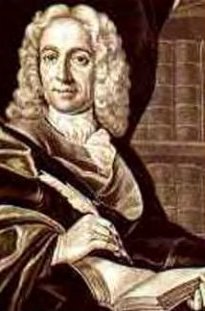 W
WMatthias Bel or Matthias Bél was a Lutheran pastor and polymath from the Kingdom of Hungary. Bel was active in the fields of pedagogy, philosophy, philology, history, and theoretical theology; he was the founder of Hungarian geographic science and a pioneer of descriptive ethnography and economy. A leading figure in pietism. He is also known as the Great Ornament of Hungary.
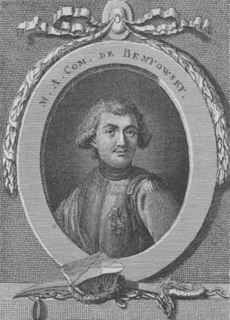 W
WCount Maurice Benyovszky de Benyó et Urbanó was a renowned military officer, adventurer, and writer from the Kingdom of Hungary, who described himself as a Hungarian and a Pole. He is considered a national hero in Hungary, Poland, and Slovakia.
 W
WLadislas Ignace de Bercheny (August 3, 1689 in Eperjes, Sáros County, Kingdom of Hungary – January 9, 1778 in Luzancy, Kingdom of France was a Hungarian-born soldier who became Marshal of France.
 W
WPéter Bod or Peter Bod was a Hungarian theologian and historian.
 W
WJános Bottyán, also known as Blind Bottyán, Vak Bottyán János was a Hungarian kuruc general.
 W
WCountess Therese [von] Brunsvik was a member of the Hungarian nobility, pedagoge and a follower of the Swiss Pestalozzi. Her father was the Hungarian count Antal Brunszvik and her mother was the baroness Anna Seeberg; her siblings were Franz, Josephine, and Charlotte.
 W
WAaron Chorin was a Hungarian rabbi and pioneer of early religious reform. He favored the use of the organ and of prayers in the vernacular, and was instrumental in founding schools along modern lines. Chorin became a pivotal figure for reformers, although he himself still operated inside a traditional framework. He also interested himself in public affairs—he took an active part in the efforts for Jewish emancipation, and was very influential with the state authorities.
 W
WChristian August of Saxe-Zeitz, was a German prince of the House of Wettin.
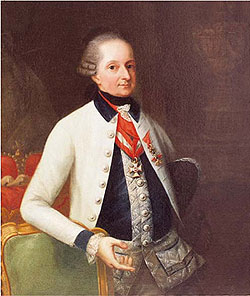 W
WNikolaus I, Prince Esterházy was a Hungarian prince, a member of the famous Esterházy family. His building of palaces, extravagant clothing, and taste for opera and other grand musical productions led to his being given the title "the Magnificent". He is remembered as the principal employer of the composer Joseph Haydn.
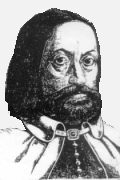 W
WJakab Fellner was the most important Baroque architect of his generation in Hungary.
 W
WIgnaz Aurelius Fessler, aka Feßler was a Hungarian ecclesiastic, politician, historian, and freemason.
 W
WJános Fusz, aged 41, was a Hungarian composer. Although he composed in many different genres, he was highly popular during his lifetime for his many songs, earning recognition from Beethoven among others.
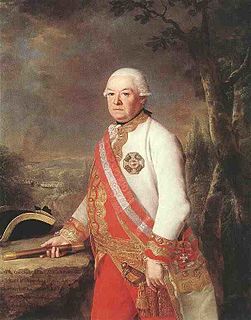 W
WCount András Hadik de Futak was a Hungarian nobleman and Field Marshal of the Habsburg Army. He was Governor of Galicia and Lodomeria from January 1774 to June 1774, and the father of Karl Joseph Hadik von Futak. He is famous for capturing the Prussian capital Berlin during the Seven Years' War.
 W
WHeinrich Hentzi von Arthurm was a Hungarian general in the army of the Austrian Empire. He was famous for his refusal to defect to the Hungarian rebels during the Battle of Buda in 1849, defending Buda city and castle on behalf of the Austrian Habsburgs.
 W
WJoseph "Krystel" Franz Freiherr von Jacquin or Baron Joseph von Jacquin was an Austrian scientist who studied medicine, chemistry, zoology and botany. The standard author abbreviation J.Jacq. is used to indicate this person as the author when citing a botanical name.
 W
WJulianna Géczy (1680-1714) was a Hungarian noblewoman. She became famous for her defense of Lőcse against the Habsburg forces in 1709-10, during the rebellion of Francis II Rákóczi, and known as the "White lady of Lőcse". She was executed in 1714.
 W
WSámuel Kálnoky (1640–1706) was a member of Kálnoky family who served as the chancellor of Transylvania.
 W
WArchduke Karl Ambrosius Joseph Johann Baptist of Austria-Este was an Archbishop of Esztergom.
 W
WGyörgy Klimó was Bishop of Pécs and founder of the Klimo Library and printing press.
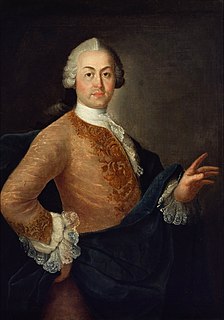 W
WCarlos Mardel was a Hungarian-Portuguese military officer, engineer, and architect. Mardel is primarily remembered for his role in the reconstruction effort after the 1755 Lisbon earthquake.
 W
WIgnác Martinovics was a Hungarian scholar, philosopher, writer, secret agent, Freemason and a leader of the Hungarian Jacobin movement. He was condemned to death for high treason and beheaded on 20 May 1795, along with count Jakab Sigray, Ferenc Szentmarjay, József Hajnóczy and others.
 W
WMichael Friedrich Benedikt Baron von Melas was a Transylvanian-born field marshal of Saxon descent for the Austrian Empire during the Napoleonic Wars.
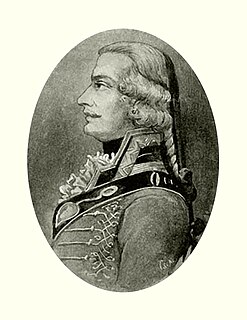 W
WJoseph de Mesko, Freiherr von Felsö-Kubiny was a cavalry general and lieutenant-general in Habsburg service during the French Revolutionary and Napoleonic wars.
 W
WFranz Xaver Messerschmidt was a German-Austrian sculptor most famous for his "character heads", a collection of busts with faces contorted in extreme facial expressions.
 W
WIbrahim Müteferrika was a Hungarian-born Ottoman diplomat, publisher, economist, historian, Islamic theologian, sociologist, and the first Muslim to run a printing press with movable Arabic type.
 W
WNicholas II, Prince Esterházy was a wealthy Hungarian prince. He served the Austrian Empire and was a member of the famous Esterházy family. He is especially remembered for his art collection and for his role as the last patron of Joseph Haydn.
 W
WManuil Mykhaylo Olshavskyi, O.S.B.M., was the bishop of the Vicariate Apostolic for the Ruthenians in Mukacheve from 1743 to his death in 1767.
 W
WFrancis II Rákóczi was a Hungarian nobleman and leader of the Hungarian uprising against the Habsburgs in 1703-11 as the prince of the Estates Confederated for Liberty of the Kingdom of Hungary. He was also Prince of Transylvania, an Imperial Prince, and a member of the Order of the Golden Fleece. Today he is considered a national hero in Hungary.
 W
WAlexander Stefan Rudnay de Rudna et Divékujfalu was a Hungarian–Slovak Roman Catholic prelate. He started as a parish priest, but later he became the Archbishop of Esztergom, the Prince Primate of Hungary and a Cardinal.
 W
WJános Sajnovics de Tordas et Káloz was a Hungarian linguist and member of the Jesuit order. He is best known for his pioneering work in comparative linguistics, particularly his systematic demonstration of the linguistic relationship between the Sami languages and Hungarian.
 W
WJános Keresztély Scitovszky de Nagykér was a Hungarian prelate, Cardinal of the Roman Catholic Church and Archbishop of Esztergom and Primate of Hungary.
 W
WLászló Skultéty was the longest serving Hungarian Hussar in Hungarian history. He served 81 years as a cavalryman before his retirement. He fought in 256 battles during 22 military campaigns and the rule of four emperors.
 W
WThe Comte de Saint Germain was a European adventurer, with an interest in science, alchemy and the arts. He achieved prominence in European high society of the mid 1700s. Prince Charles of Hesse-Kassel considered him to be "one of the greatest philosophers who ever lived". St. Germain used a variety of names and titles, an accepted practice amongst royalty and nobility at the time. These include the Marquis de Montferrat, Comte Bellamarre, Chevalier Schoening, Count Weldon, Comte Soltikoff, Graf Tzarogy and Prinz Ragoczy. In order to deflect inquiries as to his origins, he would make far-fetched claims, such as being 500 years old, leading Voltaire to sarcastically dub him "The Wonderman" and that "He is a man who does not die, and who knows everything".
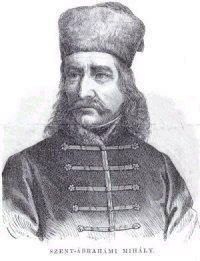 W
WMihály Lombard de Szentábrahám was a Hungarian Unitarian bishop. He re-laid the foundations of the Unitarian Church in Transylvania during a period of harassment until the accession of Joseph II and the return of an era of tolerance.
 W
WAnton Sztáray de Nagy-Mihály was a Hungarian count in the Habsburg military during Austria's Wars with the Ottoman Empire, the French Revolutionary Wars and the Napoleonic Wars.
 W
WEmeric Thököly de Késmárk was a Hungarian nobleman, leader of anti-Habsburg uprisings like his father, Count István Thököly, before him. Emeric was prince of Upper Hungary, an Ottoman vassal state, from 1682 to 1685, and briefly Prince of Transylvania during the year 1690. Having formed an alliance with the Turks, Thököly assisted the Ottoman Empire at the Battle of Vienna in 1683 and led the Turkish cavalry at the battle of Zenta. Refusing to surrender to Habsburg Emperor Leopold I, Thököly lost his principality of Upper Hungary and finally retired to Galata, near Istanbul, with large estates granted him by Sultan Mustafa II.
 W
WAugust, Graf von Vécsey or August Vécsey de Hernádvécse et Hajnácskeő was an Imperial Austrian general of Hungarian descent who fought in the French Revolutionary Wars and Napoleonic Wars. He won a notable award in 1806 and became a general officer in 1809. That year, he commanded a brigade at Wagram during the War of the Fifth Coalition. His brigade was defeated by superior numbers at Feistritz in September 1813. He led his troops during the subsequent Italian campaign in 1813 and 1814. He was promoted to higher rank in 1820 and 1840.
 W
WPeter, Freiherr von Vécsey or Peter Vécsey de Hernádvécse et Hajnácskeő was an Imperial Austrian military commander of Hungarian descent who took part in the French Revolutionary Wars and Napoleonic Wars. As a Freiherr (Baron), he was a member of the Austrian landless nobility. He make his mark while leading cavalry units and advanced in rank to become a general officer in 1808. He led an independent brigade during part of the 1809 campaign, and was mortally wounded while leading his troops in battle.
 W
WJoseph Weigl was an Austrian composer and conductor, born in Eisenstadt, Hungary, Austrian Empire.
 W
WSamson Wertheimer was chief rabbi of Hungary and Moravia, and rabbi of Eisenstadt. He was also an Austrian financier, court Jew and Shtadlan to Austrian Emperor Leopold I.